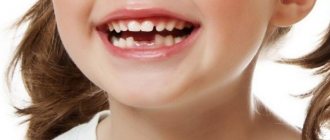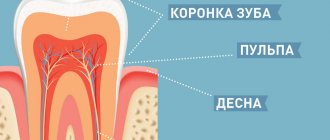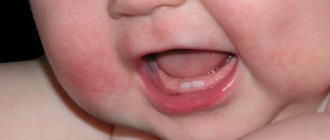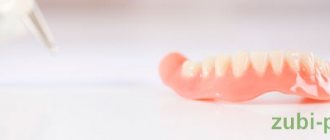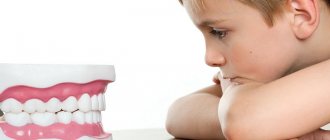The appearance of the baby’s first tooth: signs
People have always paid special attention to the appearance of children's first teeth, which is why many beliefs, traditions and superstitions have emerged associated with this event. It was believed that the future fate of the baby and his mother could be predicted only based on the age and where the first tooth appeared.
Signs associated with the eruption of the first baby tooth can have both positive and negative interpretations. Let's start with those that do not portend anything bad :
- The first tooth erupted earlier than the average , which means that the baby will soon have a brother or sister. In this case, a tooth on the upper jaw indicates a new addition to the family within the next year.
- If, on the contrary, the first tooth is delayed, it means that the child will be unusual and gifted. He will become a valuable and hardworking employee in the future.
- A wide interdental gap is interpreted in a funny way . It is believed that in the future these babies will be able to attract the attention of the opposite sex.
There are other, less positive beliefs
It is considered a bad sign if the child’s canine erupts first . In this case, the child was predicted to die soon, linking his fate with evil spirits and evil spirits.
If the first tooth is born, causing the baby great suffering , this may indicate his quarrelsome character in the future. People who are far from superstitions can give this fact a simple explanation. Parents who show excessive compassion for their child, exhausted from pain, begin to pamper him, fulfilling all his whims. The child will immediately get used to this attitude, which may subsequently become the reason for his selfishness.
If teeth do not cause trouble , and appear easily and in a timely manner, this is considered a good sign. In the future, such children will have a pleasant character and it will be easy for them to make new acquaintances and friends. Conversely, cutting through and growing too slowly may indicate communication problems in the future. It will be difficult to establish relationships with such people because of their tendency to scandals and intrigues.
Is it possible to keep fallen and pulled out teeth at home?
The loss of a child’s first baby tooth is one of the most striking events in every family, because, as a rule, it happens on the threshold of independent life, when school is already looming on the horizon.
In memory of this important stage of growing up, parents often strive to preserve the first incisors that fell out, next to the tag from the maternity hospital, the first curl of hair cut, and casts of the baby’s tiny hands and feet. However, according to popular belief, storing teeth at home is strictly not recommended.
Let's try to figure out why you can't keep them at home, and whether this is actually true.
- 1 Teeth and karma
- 2 Signs and superstitions
- 3 Scientific approach
Teeth and karma
Eastern sages have long been confident that the condition of one’s teeth can determine a person’s karma and his future destiny.
Thus, straight incisors were considered a sign of well-being and the absence of any complex life conflicts, while crooked ones testified to a complex, tangled fate.
Those with rare teeth were expected to have an easy disposition and the ability to please the opposite sex, while large, prominent incisors spoke of the evil and harsh character of their owner.
Among the Slavs, these parts of the body symbolized the connection with the clan, with the front incisors reflecting the connection with the parents, and the fangs and chewing teeth are the heritage passed on to the person by more distant relatives. The upper jaws symbolized male ancestors, while the lower jaws symbolized female ancestors.
Wisdom teeth were held in special esteem: it was believed that they grow only in spiritually mature individuals who are under the protection of their family. The reluctance of many people, especially those of the old school, to remove them stems from the belief that, having lost this part of the body, a person also loses the spiritual protection of his ancestors.
In order to prevent the outer teeth from deteriorating longer and remaining in the mouth, they were even specially charmed.
Changing a child's baby teeth was also considered a sacred event. It usually occurs around 7 years, and it is after this period that the body is completely renewed and restructured.
According to Eastern traditions, at this time the child’s karma changes, and you need to behave with him as carefully and carefully as possible, setting him up for a happy future. After 7 years, by the age of 14, the child completes the change of teeth and becomes a teenager.
And after another seven-year cycle, by the age of 21, a person becomes an adult, his wisdom teeth erupt, and he is given another chance to change karma.
Signs and superstitions
Milk teeth were a separate subject of superstition. Our ancestors considered their condition to be an indicator of what problems the child would face in adulthood.
- The eruption of the first tooth meant a lot: if it was an incisor, it was believed that such a person in the future, if desired, would be able to change his fate. When the fang erupted first, it was considered a very bad omen: according to the beliefs of different peoples, such a child would face either a bleak fate or even death in infancy. Some communities even went so far as to kill such children themselves - which is why, most likely, such an ominous sign appeared among the people.
- Another very common belief concerns lost and extracted teeth. Until the 20th century, it was believed that they should be collected and buried with the owner, since in heaven a person must account for all his teeth, and if any specimen is missing, the soul will have to go in search of it. However, the fallen milk incisors and fangs could not be stored, but burned, asking the fire to give strong permanent jaws in return.
- Many of our ancestors were seriously concerned not so much by the ephemeral opportunity to look for a lost part of the body after arriving in heaven, but by the fact that it could go to a witch who would perform a magical ritual aimed at causing harm. That is why it is believed that it is strictly forbidden to keep teeth at home or make amulets out of them, because they can easily fall into the hands of ill-wishers.
- Some peoples have another sign: if a lost tooth is found by some animal, not a human, but an animal fang will grow in its place.
Taking into account all these beliefs, in Russia, Ukraine, Poland, Georgia, Bulgaria, Germany, Great Britain and other countries, a custom has developed to throw fallen children’s incisors and fangs into the fire or bury them in the ground. In Russia, it is also allowed to give them to a mouse, asking it to give the child good, strong, sharp teeth in return.
Scientific approach
If folk wisdom clearly indicates that it is impossible to keep fallen or pulled out teeth at home, then modern science has a different opinion. From a hygienic point of view, they are absolutely safe, since they do not contain any traces of flesh.
They can be equated to such parts of the human body as nails and hair: esoteric beliefs prescribe burning them, since through these biological materials one can influence their former owner, but the vast majority of citizens still throw them in the trash.
However, given the latest scientific discoveries, thoughtless disposal of baby teeth is a very irrational act. Recently, British scientists began extracting stem cells from their pulp. Frozen material can be stored in a special jar for about 30 years and, if necessary, used to treat cancer, diabetes, stroke and other serious diseases.
Unlike materials obtained from umbilical cord blood, stem cells from baby teeth are more viable and are used to treat not only blood diseases, but also diseases of internal organs, including the brain. In addition, they can be extracted not only at birth, when there are already enough worries and expenses, but at a later age: from 6 to 12 years.
Your brownie.
(lost: 4 , rating: 4.50 out of 5)
Source: https://domovityi.ru/primety-i-sueveriya/mozhno-li-hranit-doma-zuby.html
What to give for the appearance of the first tooth?
The appearance of a long-awaited tooth is considered a big event in the baby’s family. Relatives are trying to mark and remember this event. Everyone wants to give a meaningful and memorable gift that will benefit a little tooth.
Traditionally, when the first tooth was discovered, the baby was given a silver spoon . It should not just be given as a gift, but should be knocked on the milk “recruit” so that in the future they do not get sick and do not cause trouble to its owner. Who exactly will give the gift, according to popular belief, is not particularly important. These could be godparents, grandparents, uncles and aunts.
Regarding silver, everything is obvious here. This semi-precious metal is considered not only the safest, but also endowed with magical properties. It is not for nothing that in church during baptism, the priest disinfects the water with a silver cross.
Superstitions about baby teeth
Baby teeth cause a lot of anxiety not only among children, but also among caring mothers:
- If teething causes your baby a lot of discomfort (the child cries often and his temperature rises), then signs warn that your child will have a capricious character.
- When the baby's first tooth appears, he should be given a silver spoon. The donors must be godparents.
- A chipped milk breast is a harbinger of problems in a child. Your baby may suddenly quarrel with his friend. Since children do not always know how to resolve conflict, they will need help from their parents. To reconcile children, parents must be friendly towards both parties to the quarrel.
- A lost baby tooth should not be thrown away in a public place. It will be better if your child takes it in his hand and throws it over his shoulder with the words: “Little mouse, you have a turnip tooth, but give me a bone one.” You need to throw it towards the stove. If your child likes the legends about the tooth fairy more than the version with the little mouse, you can change the text of the appeal.
Newborns with teeth
The birth of a baby with one or more teeth is considered a rather . In this case, the signs vary. In some countries, this is considered a gift of fate , and a newborn with a tooth evokes only positive emotions. In others, it is a symbol of failure . So in the Middle Ages, Europeans feared such children and considered them messengers of hell.
Popular signs
As mentioned above, the appearance of the first teeth has always been associated with various signs. Among them, the following are especially popular:
- How many teeth a baby gets out during the first year of life, how many babies his mother will have.
- The birth of a baby with one tooth is a good sign for representatives of some countries. They considered such a baby to have great physical strength. In the future, such a child could become an excellent warrior and protector.
- If teeth grow frequently, without gaps , this is considered a sign that the baby will grow up to be tight-fisted and amorous.
Other beliefs
Based on which tooth fell out or lost its integrity, village healers gave people advice on where problems await them. Losing a lateral incisor is a warning sign that you may become seriously ill.
If your front tooth breaks off on its own, the sign recommends that you prepare for troubles in your personal life. If someone knocks out this tooth, popular beliefs promise you generous compensation: a new promising job, increased prosperity. Other signs:
- a gap between the teeth is a trait of leaders, charming and honest people;
- sparse teeth are a sign that their owner is harsh;
- small teeth speak of a person’s cunning;
- owners of frequent teeth are cheerful and amorous;
- if you grind your teeth in a dream, you are being damaged;
- In the old days, a person who has double teeth was considered a urochnik, that is, capable of casting the evil eye.
Customs about tooth loss
The first tooth falling out is considered an equally significant event . There are various customs and traditions that can tell parents what to do in this case.
Our ancestors considered it necessary to throw the first tooth that fell out behind the stove so that the mouse would take it and bring a new, permanent one in return . As a game moment, it was allowed for the child himself to do this. In this case, a throw over the left shoulder was considered a mandatory requirement . This custom was aimed at ensuring that the baby’s teeth changed faster and would not cause trouble in the future.
Today there are practically no stoves left anywhere, so the ancient ritual has been slightly changed. The tooth can be thrown to any other place where the mouse can find it: in the forest or on the field.
Another ritual involves handing over a baby tooth to a brownie through a hearth or fireplace . The brownie had to keep the lost tooth and send a new one in return.
A tradition beloved by modern children, which came to us from other countries, is the transfer of a tooth to a magic fairy. In this case, you need to hide the fallen tooth under the pillow . In the morning, as compensation from the fairy, the baby must find coins to replace the lost tooth. This is just fun, so parents should take care of a nominal fee.
How to celebrate the first tooth and what is customary to give as a gift
Signs when the first tooth comes out, almost everyone agrees that a spoon made of silver should be presented as a gift for such an event. Such a gift must be given at the moment when the first incisor is cut. In the old days, godparents had to buy such a gift and tap it on the protruding edge of the tooth. Such a gesture meant that soon the baby would try a new food, for which he would need to use this cutlery. Today, parents can also buy a spoon.
Having performed such a ritual, the baby is predicted to have strong and problem-free teeth throughout his life. Also, such a gift promises the little person a happy future and consistency in it.
To avoid pain during teething, the silver cutlery must be cooled and applied to the inflamed gums. This action will greatly reduce pain and help the baby calm down.
Our ancestors tried to pay as much attention as possible to their child during this period of his life. It was believed that black spirits could take advantage of a weakened state.
Should you keep or throw away baby teeth?
Keeping or throwing away the first teeth that fall out is a personal matter for each parent . Superstitious people believe that it is better to preserve them. Because discarded teeth can be found by enemies and bring damage or the evil eye to its owner.
Many mothers keep special boxes where they put all the things that remind them of the wonderful events associated with their children. It is in such a box that you can put your child’s teeth, along with the first hairs and a tag from the maternity hospital.
Today, signs and customs associated with baby teeth are gradually fading into the background. Modern parents are increasingly approaching this issue based on a scientific point of view. But no one prevents us from sometimes turning to the traditions of our ancestors, leaving only good signs and customs in the present.
Signs about tooth loss
What possible dangers do signs of a broken tooth indicate:
- Someone is trying to destroy you using witchcraft; if there are many envious people around you, you should not flaunt your achievements.
- An illness is approaching, which may disrupt your plans;
- a tooth breaks - expect separation from a loved one; the reasons for separation can be different, such as moving to a foreign country or the betrayal of the bride or groom;
- if the fall is painful, with loss of blood, beliefs promise the person the death of a relative or close friend;
- the loss of an incisor by a husband or wife soon after the wedding indicates that the life of a young family will be overshadowed by quarrels or lack of heirs.
What does partial damage mean:
- If you are suing someone for theft of property, a chipped incisor hints that the court's decision will be in favor of your opponents.
- To lose a piece of something indigenous is to lose some of your material wealth. The more you feel pain after an unpleasant incident, the more you will lament the lost money.
- A hole in a tooth may indicate that your co-workers are jealous of you. It is possible that damage is being done to you.


